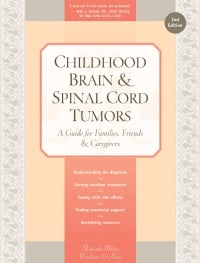Childhood Brain and Spinal Cord Tumors
How chemotherapy drugs work
Normal, healthy cells divide and grow in a well-established pattern. When these cells divide, an identical copy is produced. The body only makes the number of normal cells it needs at any given time. As each normal cell matures, it loses its ability to reproduce. Normal cells are also preprogrammed to die at specific times.
In contrast, tumor cells reproduce uncontrollably and grow in unpredictable ways. They invade surrounding tissue and cause disruptions in the functions of the normal brain and spine.
All chemotherapy drugs work in some way to interfere with the cancer cells’ ability to live, divide, and multiply. Some of the types of drugs used to treat brain and spinal cord tumors are:
- Alkaloids. These drugs, derived from plants, interrupt cell division through a variety of mechanisms, including interfering with DNA and specific enzyme activities. They also disrupt the membrane (outer wall) of the cancer cell, causing cell damage or cell death.
- Alkylating agents. All cells contain DNA and RNA, which provide the instructions needed by cells to make exact copies of themselves. Alkylating agents poison cancer cells by interacting with DNA or RNA to prevent cell reproduction.
- Antibiotics. This type of drug prevents cell growth by blocking reproduction, weakening the outer wall of the cell, or interfering with certain cell enzymes.
- Antimetabolites. These drugs starve cancer cells by replacing essential cell nutrients that are necessary during the synthesis phase of the cell cycle (growth in preparation for cell division).
- Hormones. These drugs create a hostile environment that slows cell growth. They can also signal to cancer cells that it is time to die.
- Immunotherapeutic agents. These substances, usually used in targeted therapies, either encourage the cancerous cells to die or help the body destroy them. (For more information, see Chapter 3, Types of Tumors.)
- Protein inhibitors. These drugs interfere with tumor cells’ ability to reproduce by depriving the cells of specific proteins necessary for cell growth and division.
- Anti-angiogenesis agents. Drugs in this category have the ability to disrupt the blood supply to the tumor, depriving it of nutrients necessary for growth.
Table of Contents
All Guides- Introduction
- 1. Diagnosis
- 2. The Brain and Spinal Cord
- 3. Types of Tumors
- 4. Telling Your Child and Others
- 5. Choosing a Treatment
- 6. Coping with Procedures
- 7. Forming a Partnership with the Treatment Team
- 8. Hospitalization
- 9. Venous Catheters
- 10. Surgery
- 11. Chemotherapy
- 12. Common Side Effects of Chemotherapy
- 13. Radiation Therapy
- 14. Peripheral Blood Stem Cell Transplantation
- 15. Siblings
- 16. Family and Friends
- 17. Communication and Behavior
- 18. School
- 19. Sources of Support
- 20. Nutrition
- 21. Medical and Financial Record-keeping
- 22. End of Treatment and Beyond
- 23. Recurrence
- 24. Death and Bereavement
- 25. Looking Forward
- Appendix A. Blood Tests and What They Mean
- Appendix C. Books and Websites

